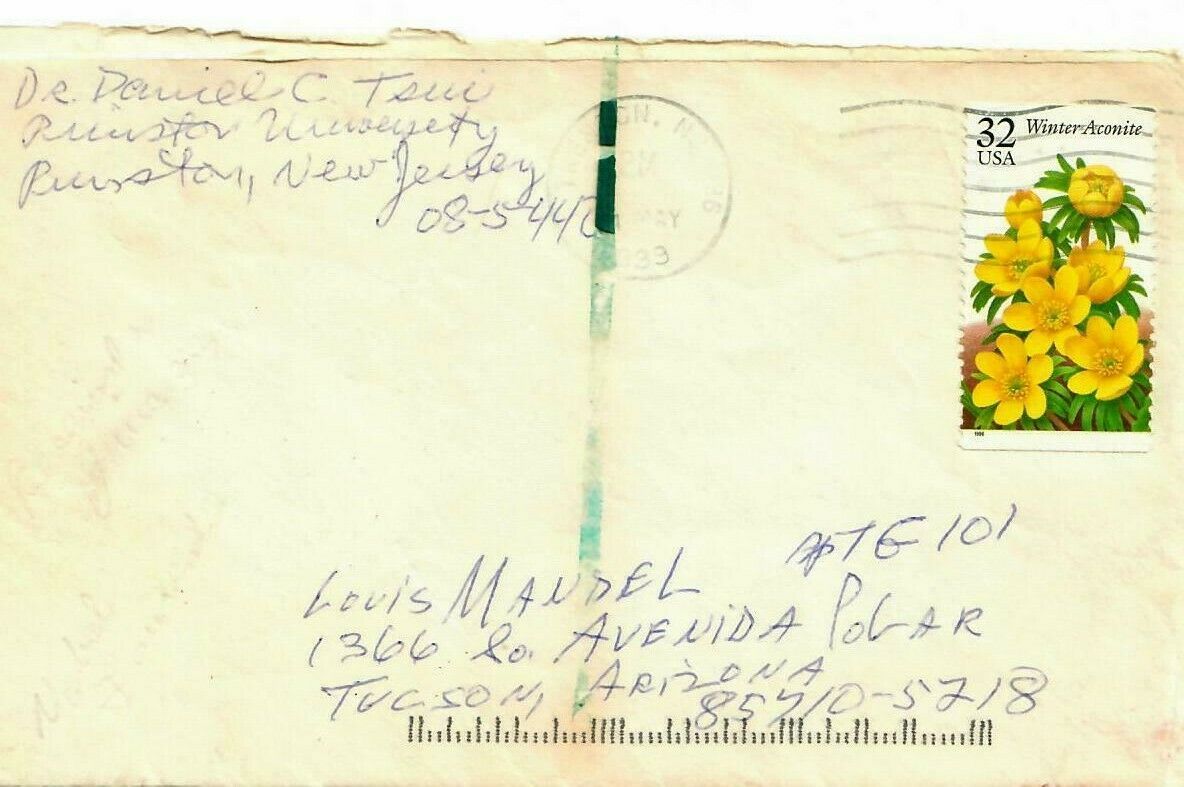-40%
"Nobel Prize in Physics" Daniel C. Tsui Hand Addressed Envelope Todd Mueller COA
$ 316.79
- Description
- Size Guide
Description
Up for auction the"Nobel Prize in Physics" Daniel C. Tsui Hand Addressed Envelope Dated 1999.
This item is authenticated By Todd Mueller Autographs and comes with their certificate of authenticity.
ES-6489E
Daniel Chee Tsui
(
Chinese
:
崔琦
;
pinyin
:
Cuī Qí
, born February 28, 1939) is a Chinese-born American
physicist
,
Nobel
laureate, and the Arthur Legrand Doty Professor of Electrical Engineering, Emeritus, at
Princeton University
. Tsui's areas of research include electrical properties of thin films and
microstructures
of
semiconductors
and
solid-state physics
. Tsui shared the 1998
Nobel Prize in Physics
with
Robert B. Laughlin
and
Horst L. Störmer
"for their discovery of a new form of quantum fluid with fractionally charged excitations." Tsui was born into a humble Chinese family with two illiterate parents in
Fanzhuang
(
范庄
),
Henan
, China, on February 28th, 1939. Born in the midst of the
Japanese invasion of China
during the
Second World War
, Tsui described his early childhood memories as being "filled with the years of drought, flood and war which were constantly on the consciousness of the inhabitants of my over-populated village."
In 1951, Tsui left for
Hong Kong
to attend
Pui Ching Middle School
in
Kowloon
, beginning his formal education at the level of sixth grade in his second year in Hong Kong. Tsui recalled facing difficulties due to his lack of familiarity with Cantonese dialect. Due to the war, many teachers at Pui Ching were graduates from China's most distinguished universities, such as
Peking University
, who otherwise would have likely been esteemed academics and scientists. Upon graduating in 1957, Tsui was admitted to the
National Taiwan University
Medical School, but due to uncertainties over whether he would be able to return to his family in China, he remained in Hong Kong to enroll in Special Classes Centre, a special two-year government program intended to prepare high school graduates for entrance into the
University of Hong Kong
. While preparing for the entrance examination to the University of Hong Kong in spring of 1958, Tsui was awarded a full scholarship to attend
Augustana College
, his church pastor's Lutheran
alma mater
in the
United States
. Accepting the scholarship, Tsui arrived at Augustana College just after
Labor Day
of 1958. After spending three years at Augustana College, Tsui graduated
Phi Beta Kappa
in 1961 as the only student of Chinese descent in his college. Tsui continued his study in physics at
the University of Chicago
, from where he received his
Ph.D.
in physics in 1967 after completing a doctoral dissertation, titled "de Haas-van Alphen effect and electronic band structure of nickel", under the supervision of Royal Stark.
[4]
[5]
[6]
He remarked that due to the influence of prominent Chinese theoretical physicists and Nobel laureates
C. N. Yang
and
T. D. Lee
, both of whom studied at the University of Chicago, he had always knew that he wanted to pursue graduate studies in physics at the institution. While a graduate student at the University of Chicago, Tsui met Linda Varland, who was an undergraduate student there at the time, and the two married after the latter's graduation. Tsui is a naturalized U.S. citizen. Tsui and Varland have two daughters, Aileen and Judith. Judith graduated magna cum laude from Princeton University with an B.A. in anthropology in 1991 and is now an associate professor of medicine at the
University of Washington School of Medicine
.
After receiving his Ph.D. and then remaining in Chicago for a year of postdoctoral research, Tsui joined the research staff at
Bell Laboratories
to perform research in solid state physics in 1968. At Bell Laboratories, instead of studying main stream topics of interest in semiconductor physics such as optics and high energy band-structures or their applications in devices, Tsui devoted his attention to a new field called the physics of two-dimensional electrons. Tsui and Störmer made the groundbreaking discovery of the
fractional quantum Hall effect
in 1982, while Laughlin provided a theoretical interpretation for the discovery the following year. This discovery will eventually be the reason of their winning of the 1998 Nobel Prize in Physics. Shortly after the discovery, Tsui departed from Bell Laboratories and joined the faculty of the Department of Electrical Engineering and Computer Science at Princeton University with the support of two Nobel laureates in February of 1982. After 28 years at Princeton, Tsui transferred to emeritus status in 2010. He was also an adjunct senior research scientist in the physics department of
Columbia University
, and a research professor at
Boston University
.
Tsui is one of the 20 American recipients of the Nobel Prize in Physics to sign a letter addressed to President
George W. Bush
in May of 2008, urging him to "reverse the damage done to basic science research in the Fiscal Year 2008 Omnibus Appropriations Bill" by requesting additional emergency funding for the
Department of Energy
’s
Office of Science
, the
National Science Foundation
, and the
National Institute of Standards and Technology
.










